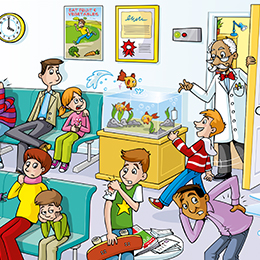You can help your child improve their English by giving them lots of opportunities to use English. This will help your child to feel more confident and prepared for their English exams.
If learning English seems very challenging, break it down into smaller tasks. For example, your child shouldn’t try to learn lots of new words in one go. Instead, they should focus on learning a few new words every week. They will be much more likely to remember them!
Here are some ideas you can try at home.
Free vocabulary picture books and lists
Our research project, English Profile, finds the English vocabulary that speakers tend to use at each level of language learning. We then produce free vocabulary lists, so that your child can learn the most useful English words.
Download our free Pre A1 Starters, A1 Movers and A2 Flyers Word List Picture Books.
Download our free vocabulary lists for A2 Key for Schools and B1 Preliminary for Schools.
Learning tip for 5–12 year olds
Look at the vocabulary pictures together. For example, here’s a picture called At the doctor’s. Try using a mixture of closed questions, which assess quick factual knowledge (e.g. Where is the doctor?), and open questions, which assess reasoning (e.g. Why do you think the doctor is looking surprised?).

Learning tip for 13–18 year olds
Try learning vocabulary and playing fun games at the same time! For example, you could use the words in our free picture books and vocabulary lists to play Charades or Pictionary.
Flashcards
Flashcards are really useful resources. Research shows that vocabulary learning improves when children have visual images.
Your child can make their own flashcards. On one piece of card, write a word. On another piece of card, add a picture for that word. Your child could illustrate their cards with their own drawings and keep them in a ‘favourite word box’.
Encourage them to use some of these new words in stories they create. Remember that children learn language best when they can communicate, not just memorise words.
Learning tip
Flashcards are a great resource because they can be used in many different ways. Here are some fun games you can play with your flashcards:
- Which word am I?: Put all of the word cards, facing down, on a table. Choose a picture card (don’t show the card to your child). Give your child clues about the picture. How many clues does your child need to pick the right word?
- Snap: Give each player a pile of cards that are face down. Player 1 turns over a card, then player 2, and so on. If two cards match, shout ‘Snap!’ The player who says ‘snap’ first can keep all the turned-over cards if they can use the word in a sentence.
- Categories: Ask each player to sort three or four cards into a category of their own choosing. Can the other players guess the category?
- Memory: Put all the cards face down. Player 1 turns over two cards. They can keep any matching cards if they can use that word in a sentence. If the cards don’t match, put them back face down. Now player 2 turns over two cards.
- Odd one out: Sort the cards into groups and include an ‘odd one out’ in each group. Ask your child to find the ‘odd one out’ in each group and explain why.
- Bingo: Ask your child to make some bingo cards (e.g. a 2 x 2 grid). Write a word in each box of the grid. Family members who don’t speak English can use bingo cards in their own language. Now, turn over one picture flashcard at a time. If a player has the matching word on their bingo card, put a counter on top of the word. When you have counters on every word on the bingo card, shout ‘Bingo!’
- Challenge: Ask each player to choose one word flashcard and one picture flashcard . If the player completes their challenge successfully they get one point. Here are some example challenges:
- Word flashcard challenge: use the word in a sentence
- Word flashcard challenge: say the word in a funny voice
- Word flashcard challenge: draw the word
- Picture flashcard challenge: guess the right word for the picture, then spell the word
- Picture flashcard challenge: act out the picture
- Picture flashcard challenge: describe the picture as another person draws it.
- Funny sentences: Select some cards with different nouns, verbs and adjectives, for example, ‘my dad’, ‘my dog’, ‘likes eating’, ‘loves wearing’, ‘big’, ‘purple’, ‘handbags’, ‘snakes’. Take turns to choose cards to make funny sentences.
Free online learning activities
Encourage your child to try some of our fun learning activities, which are available to use on a computer or on a tablet.
Learning tip for 5–12 year olds
Your child can practise their English with these fun learning activities and games.
Learning tip for 13–18 year olds
Encourage your child to try some of our free vocabulary and grammar activities, and games.